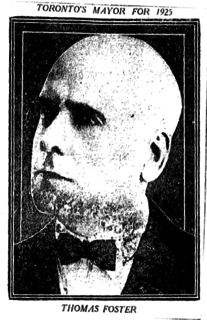Municipal elections were held in Toronto, Ontario, Canada, on January 1, 1936. Sam McBride was elected mayor in a three-way race in which incumbent James Simpson finished third.
Municipal elections were held in Toronto, Ontario, Canada, on January 1, 1935. James Simpson won a surprise victory in the mayoral campaign to become the first socialist candidate elected to the office.
Municipal elections were held in Toronto, Ontario, Canada, on January 1, 1932.
Municipal elections were held in Toronto, Ontario, Canada, on January 1, 1931. William James Stewart was elected mayor after winning a close contest again former mayor Sam McBride.
Municipal elections were held in Toronto, Ontario, Canada, on January 1, 1930. In a close mayoral election Bert Wemp ousted two term incumbent Sam McBride. The main issue of the election was a proposed downtown beautification scheme that would have rebuilt roads in the core. The proposal was rejected in a referendum after voters in the suburbs voted against it. McBride was the plan's leading proponent, and its rejection hurt his reelection bid.
Municipal elections were held in Toronto, Ontario, Canada, on January 1, 1929. Sam McBride, who had been elected the year previous, was reelected mayor defeating former Alderman Brook Sykes by a large margin.
Municipal elections were held in Toronto, Ontario, Canada, on January 1, 1927. Thomas Foster was running for his third consecutive term as mayor and won a narrow victory over Sam McBride. There were two referendums as part of the vote. Toronto voters voted in favour of adopting daylight saving time for the city. They also voted in favour of spending money to create an ornate gate at the entrance to the Exhibition Place, which became the Princes' Gates.
Municipal elections were held in Toronto, Ontario, Canada, on January 1, 1926. Thomas Foster was reelected mayor.
Municipal elections were held in Toronto, Ontario, Canada, on January 1, 1925. Thomas Foster was elected mayor ousting incumbent Wesley Hiltz. The election included a referendum where voters passed a motion in favour of building a new water plant. This eventually became the R. C. Harris Water Treatment Plant.
Municipal elections were held in Toronto, Ontario, Canada, on January 1, 1924. Wesley Hiltz was elected mayor defeating two prominent challengers.
Municipal elections were held in Toronto, Ontario, Canada, on January 1, 1923. Charles A. Maguire was reelected to his second term as mayor.
Municipal elections were held in Toronto, Ontario, Canada, on January 1, 1920. Mayor Tommy Church was elected to his sixth consecutive term in office. The most notable feature of the election was Constance Hamilton winning a seat in Ward 3. She became the first woman elected to as high a post in any government in Ontario.
Municipal elections were held in Toronto, Ontario, Canada, on January 1, 1919. Mayor Tommy Church was elected to his fifth consecutive term in office. This election marked the creation of Ward 8, covering the recently annexed areas of East Toronto. The representation of Ward 7 was also increased to have three alderman like every other ward.
Municipal elections were held in Toronto, Ontario, Canada, on January 1, 1918. Mayor Tommy Church was elected to his fourth consecutive term in office.
Municipal elections were held in Toronto, Ontario, Canada, on January 1, 1917. Mayor Tommy Church was acclaimed to his third consecutive term in office.
Municipal elections were held in Toronto, Ontario, Canada, on January 1, 1916. Mayor Tommy Church was elected to his second term in office.
Municipal elections were held in Toronto, Ontario, Canada, on January 1, 1915. Tommy Church was elected mayor defeating Jesse O. McCarthy.
Municipal elections were held in Toronto, Ontario, Canada, on January 1, 1914. H.C. Hocken was reelected mayor defeating Fred McBrien. The election was also notable for the victory of Louis Singer, the first representative of Toronto's large Jewish community elected to city council.
Municipal elections were held in Toronto, Ontario, Canada, on January 1, 1912. Mayor George Reginald Geary faced no opponents and was acclaimed for reelection.



